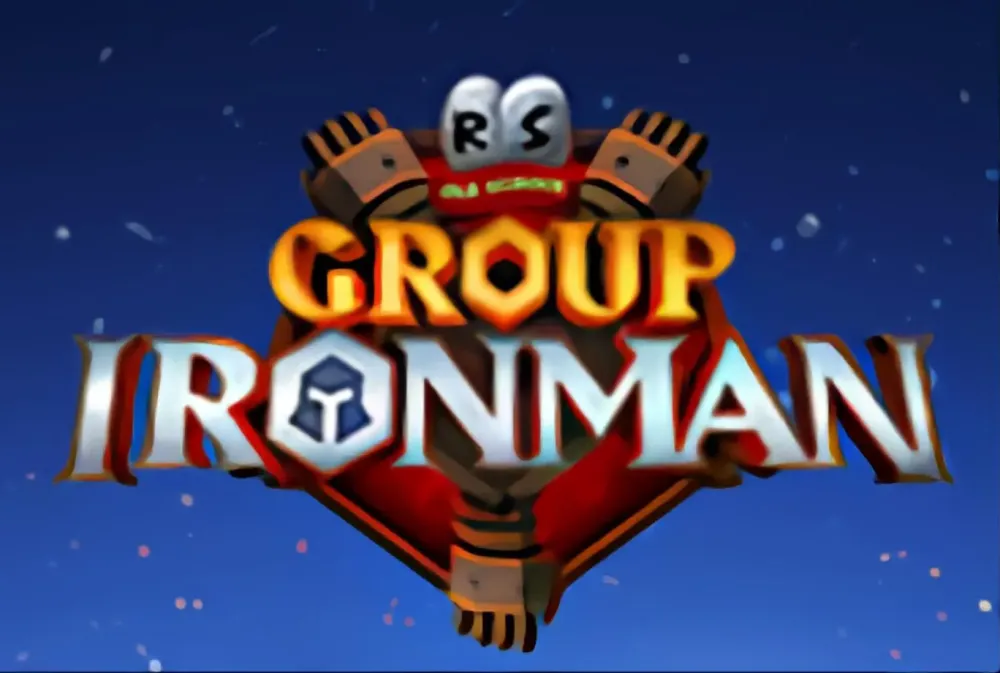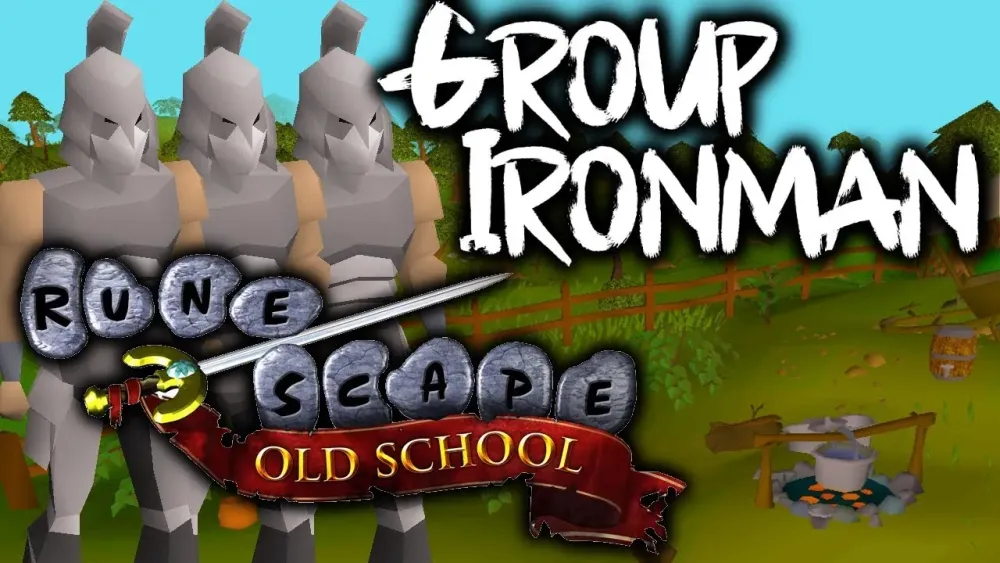Your cart is empty
Everything You Need to Know About Kicking Group Ironman in OSRS

Group Ironman mode in Old School RuneScape (OSRS) offers players a unique twist on the traditional Ironman experience, allowing friends to tackle challenges together while still adhering to the self-sufficient principles of Ironman gameplay. In this mode, players form a group where they can share resources, complete quests, and level skills collaboratively. This article will delve into the mechanics of Group Ironman, focusing on the implications of kicking a member from the group and what that means for the remaining players.
Kicking a member from a Group Ironman team in OSRS refers to the action of removing a player from the group, which can have significant implications for both the kicked member and the remaining team members. This action is typically initiated when a member is deemed unfit for the group, either due to inactivity, failure to contribute, or personal conflicts. The process of kicking a member is straightforward but should be approached with caution, as it can affect group dynamics and overall morale.
When a member is kicked, they lose their status within the group and cannot participate in any remaining group activities. This includes being unable to share items, experience points, or resources that were previously available to them as part of the team. The kicked member’s account will revert to a standard Ironman account, meaning they will no longer benefit from the collaborative gameplay mechanics that Group Ironman offers.
It’s important to note that once a member is kicked, they cannot rejoin the same group. This finality emphasizes the need for careful consideration before taking such action. Leaders or members considering a kick should communicate openly with the team to discuss any issues before resorting to this measure. Establishing clear expectations and guidelines for group behavior can help mitigate conflicts and reduce the likelihood of needing to kick a member.
Additionally, the decision to kick a member can also lead to potential issues regarding the distribution of shared items and resources. The remaining members must decide how to handle any assets that were pooled together, and clear communication is crucial to ensure that all players feel treated fairly. A group may need to establish rules for item division ahead of time to avoid disputes later on.
In summary, kicking a member from a Group Ironman team in OSRS is a significant decision that can alter the group’s dynamics and gameplay experience. It is essential for teams to foster an environment of communication and collaboration to minimize conflicts and ensure a successful and enjoyable experience for all members involved.
Reasons to Kick a Member from Your Group

When participating in a Group Ironman (GIM) in Old School RuneScape (OSRS), teamwork is crucial for success. However, there may come a time when you need to consider kicking a member from your group. Here are some common reasons why you might find this necessary:
- Lack of Participation: If a member is consistently inactive or fails to contribute to the group’s efforts, it can hinder progress. GIM relies on everyone pulling their weight.
- Negative Attitude: A member who frequently complains or spreads negativity can create a toxic environment, affecting the morale of the group.
- Rule Violations: Every group should establish its own set of rules. If someone breaks these rules, it can lead to discord and may warrant a kick.
- Skill Mismatch: Sometimes, a member may not possess the required skills or knowledge, making it challenging for the group to advance effectively.
- Disagreements on Group Strategy: If a member consistently disagrees with the group’s strategies or goals, it can lead to conflicts that disrupt operations.
It’s essential to communicate openly with your group members before making such a significant decision. Kicking a member should ideally be a last resort after discussing any issues and attempting to resolve them amicably.
How to Kick a Member: Step-by-Step Guide
Kicking a member from your Group Ironman team in OSRS is a straightforward process, but it’s important to handle it delicately. Here’s a step-by-step guide to help you through it:
- Open the Group Interface: Start by accessing the Group Ironman interface. You can find this by clicking on the “Group Ironman” option in your game menu.
- Select the Member: In the group interface, you’ll see a list of all members in your group. Select the member you wish to kick.
- Check Current Status: Before proceeding, check the member’s activity and contributions. This is a good moment to reconsider if kicking is absolutely necessary.
- Initiate the Kick: Once you’ve made your decision, look for the “Kick” option next to the member’s name. Click on it to initiate the process.
- Confirm the Action: A confirmation prompt will appear, asking if you’re sure you want to kick this member. Take a moment to confirm your choice.
- Notify the Member: After the kick, it’s courteous to inform the member about the decision and the reasons behind it. This helps maintain communication and respect.
And that’s it! You’ve successfully kicked a member from your Group Ironman team. Remember, while this process is simple, maintaining good relationships with your remaining members is crucial for future success.
5. Impacts of Kicking a Member on Your Group
Kicking a member from your Group Ironman (GIM) team in Old School RuneScape (OSRS) is a significant decision that can have various impacts. Understanding these impacts can help you manage your group dynamics more effectively.
First and foremost, the morale of the remaining members can be affected. When a member is kicked, it can lead to feelings of uncertainty and tension among the team. Here are some specific impacts to consider:
- Team Dynamics: The chemistry of your group may change. It’s essential to ensure that the remaining members are still on the same page and share the same goals.
- Trust Issues: If a member is kicked without proper communication, it might lead to trust issues within the group. Remaining members may worry about their standing and whether they could also be removed.
- Skill and Experience Loss: Depending on the kicked member’s skills and contributions, the group may lose valuable experience or resources, which can slow down progress.
- Group Activities: The group’s ability to tackle certain challenges may be hindered. For example, if the kicked member was crucial for a specific skill or task, the group may need to rethink its strategies.
- Future Recruitment: The incident may affect how you recruit new members. Potential recruits might be hesitant if they learn about internal conflicts.
In summary, kicking a member should be a carefully considered decision, as its implications can ripple through the entire group. Communication and transparency can help mitigate some of these impacts.
6. Common Mistakes to Avoid When Kicking a Member
Kicking a member from your GIM team is not something to take lightly. There are several common pitfalls that leaders often encounter during this process. Here’s a rundown of mistakes to avoid:
- Failing to Communicate: One of the biggest mistakes is not discussing the issues with the member before the kick. Always address concerns directly with the individual first.
- Making a Rash Decision: Acting impulsively can lead to regrettable choices. Take your time to evaluate the situation thoroughly before making a final call.
- Ignoring Group Consensus: Don’t make unilateral decisions without consulting other group members. Involve them in the discussion to build a consensus.
- Not Documenting Issues: If you have ongoing problems with a member, document these issues. This can provide clarity about the reasons behind the kick.
- Overlooking Replacement: Kicking a member without a plan for their replacement can leave your group vulnerable. Consider how you will fill the gap left behind.
- Neglecting Aftermath Communication: Once the member is kicked, communicate with the rest of the group about what happened and why. This transparency helps maintain trust.
Avoiding these mistakes can help ensure a smoother transition and maintain cohesion within your Group Ironman team. Always act thoughtfully and prioritize communication for the best outcomes.
Alternatives to Kicking: Resolving Conflicts
When you’re part of a group in OSRS Ironman mode, conflicts can arise. Whether it’s disagreements over loot distribution, differing play styles, or miscommunications, it’s essential to have strategies in place to resolve these issues without resorting to kicking members. Here are some alternatives to consider:
- Open Communication: Always encourage group members to express their thoughts and concerns openly. Setting up a group chat can facilitate smoother discussions.
- Set Clear Expectations: Before starting your adventures, establish clear rules for gameplay, loot sharing, and conflict resolution. This can prevent misunderstandings later on.
- Mediation: If tensions rise, appoint a neutral party to mediate the discussion. This person can help ensure that everyone’s voice is heard and guide the group towards a resolution.
- Temporary Breaks: Sometimes, stepping away from the situation can help. Encourage members to take a break if emotions run high, allowing them to return with a clearer mindset.
- Feedback Sessions: Regularly schedule times to discuss what’s working and what isn’t in the group dynamic. This proactive approach can prevent issues from escalating.
- Consider Compromise: Encourage group members to be flexible. Sometimes, finding a middle ground can strengthen relationships within the team.
By utilizing these strategies, you can address conflicts in a constructive manner, keeping the group united and focused on the goals of your Ironman journey.
Conclusion: Navigating Group Dynamics in Ironman Mode
Navigating group dynamics in Ironman mode can be both challenging and rewarding. The key lies in maintaining a healthy balance between individual goals and group objectives. Here are a few takeaways to help you succeed:
- Build Trust: Trust is the foundation of any successful group. Ensure that all members feel valued and respected.
- Embrace Diversity: Each member may bring different play styles and strategies to the table. Embrace these differences as they can enhance your group’s overall performance.
- Stay Flexible: Be prepared to adapt your strategies and expectations. The dynamic nature of group play requires a degree of flexibility and willingness to pivot.
- Celebrate Achievements: Acknowledge milestones and achievements, both big and small. This fosters a sense of camaraderie and keeps morale high.
- Have Fun: Remember, the primary goal of playing OSRS is to have fun! Keep the spirit of enjoyment alive, even during challenging moments.
By focusing on effective communication, collective goals, and mutual respect, you can navigate the complexities of group dynamics in Ironman mode. This will not only enhance your gameplay experience but also foster lasting friendships within the OSRS community.

